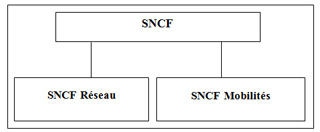9 January 2015: Railway reform

The Autorité de la concurrence issues its opinion on four draft implementing decrees
The Autorité considers that some measures entail significant risks to the development of competition in the sector
and issues several recommendations aimed in particular at strengthening the independence of rail infrastructure management.
CONTEXT
The draft decrees referred to the Autorité for an opinion have been formulated within the context of the reform of the rail sector. The future architecture is based on the creation of a public railway group (Groupe public ferroviaire, GPF). This GPF incorporates, under the umbrella of a controlling state-owned industrial and commercial institution (EPIC) called “SNCF”, an EPIC named “SNCF Réseau” that will take over the management of the infrastructure and another named “SNCF Mobilités” that will be responsible for operating rail transport services. The following is a diagram of the new structure:

The Autorité already issued an opinion on 4 October 2013 (opinion 13-A-14) on the competitive impact of the bill referred to it. While numerous recommendations formulated in this opinion were taken into account in the law of 4 August 2014 on railway reform, recommendations regarding the role of the controlling EPIC in the railway system, in terms of areas of responsibility, tasks and governance, were not included.
Following a referral by the government of four draft decrees taken pursuant to this law (three draft decrees on the tasks and statutes of each of the GPF’s EPICs and one on the independence of the core functions linked to the network), the Autorité considers that the desired balance between the two aims, namely the industrial integration of the new structure, a factor of economic efficiency, on one hand, and the independence of infrastructure management that is essential for the development of fair competition on the other, has not been reached. As a result, it sets out a series of recommendations aimed in particular at reinforcing the independence of railway infrastructure management.
1 - Reinforcing SNCF Réseau’s conditions of independence
SNCF Réseau manages the national rail network for all the railway operating companies on the market. Since SNCF Réseau is no longer independent, but forms now part of a public railway group, it would seem crucial for it to be endowed with all the guarantees of independence which are necessary to ensure the neutrality and objectivity of its choices, which must not be tainted by any suspicion of influence from the new EPIC SNCF Mobilités, which likewise forms part of the GPF.
These guarantees of independence are especially necessary for the “core functions”, namely the tasks of distributing train paths (the right for a train to use the railway network within a given timetable and route) and pricing access to the rail network. However sufficient guarantees do not seem to be foreseen to ensure independence, particularly as regards to the decision-making processes used by the Board of Directors.
A third of the SNCF Réseau Board of Directors is indeed comprised of representatives of SNCF (the controlling EPIC) who, according to the draft decrees, will take part in decision-making affecting core functions while representing both the interests of the incumbent transport operator and SNCF Réseau, thus constituting a conflict of interest.
> As a result, in line with other European countries that have adopted the same type of railway governance, the Autorité recommends that SNCF representatives are rendered ineligible to vote on decisions by the SNCF Réseau Board of Directors on matters of distribution of train paths or network access pricing (recommendation No.1). |
In addition, among the guarantees of SNCF Réseau’s independence set out in the “core functions” draft decree, the Autorité has some concerns about the limits applied to the functioning of the national rail system’s ethics commission, which is responsible for ensuring that any SNCF Réseau staff member wishing to join a railway operating company is not subject to any conflict of interest.
> The Autorité recommends that cases of mandatory referral to this commission should be extended to all SNCF Réseau management staff with access to confidential information and that this commission should not be allowed to give favourable opinions by tacit consent (recommendation No. 2c) |
2 - Endowing passenger station management with genuine independence conditions
The Autorité notes that despite the recommendations issued since 2009, the internal measures of independence foreseen in the draft decrees are not yet sufficient to guarantee genuinely non-discriminatory access to passenger stations, which are an essential infrastructure to allow new rail transport companies to enter the market.
The Autorité considers that the transparent, non-discriminatory management of passenger stations is not a matter for the Board of Directors of SNCF Mobilités, who would be in situation of conflict of interest, but rather for the Director of Stations. Therefore, the Director of Station must be endowed with guarantees of independence in order to ensure that any decisions made in relation to the incumbent transport operator on one hand, and other railway operating companies on the other, are not tainted by any suspicion of partiality.
> It also proposes various measures relating to the material independence of station management, confidential data management and ethical obligations on the part of staff, aimed at guaranteeing the independence of the autonomous management responsible for managing passenger stations within SNCF Mobilités (recommendations No. 3d to 3g).
3 - Clarifying the scope of activity and tasks of the controlling EPIC
In its opinion 13-A-14, the Autorité emphasised the competition risks inherent to the configuration of the controlling EPIC (SNCF), in particular as a result of the vagueness of the tasks’ scope definition. Most of its recommendations on this point were not included in the law on railway reform.
The draft decrees likewise fail to specify these tasks, which are not exhaustive. Above all, they increase the possibilities for the “mutualisation” of areas of responsibility, which could be withdrawn from SNCF Mobilités and SNCF Réseau and exclusively carried out by the controlling EPIC.
The Autorité expresses heightened concerns on this scheme for two reasons:
- the establishment of a controlling EPIC with responsibility for multiple tasks that were not originally envisaged and taken from the specialist EPICs would be liable to hinder the exercise of the authority granted to them by law to ensure impartial infrastructure management. This is the case in particular for the mutualised management of the real estate assets of the EPICs SNCF Réseau and SNCF Mobilités, a part of which at least is essential if they are to carry out the tasks with which they have been entrusted.
- furthermore, these measures entail the risk that a number of companies would be crowded out from the market, since SNCF Réseau and SNCF Mobilités would be obliged only to use the controlling EPIC’s services for mutualised functions. Activities that the law has now opened to competition, such as engineering operations on the railway infrastructure, would once again be subject to an SNCF monopoly.
|
4 - Reinforcing the tools and resources of ARAF, the sector regulator
In view of the ever-increasing number of missions and tasks with which ARAF is entrusted, the Autorité de la concurrence would like the draft decrees in question to allow it to exercise effectively its general role as guarantor of transparent, non-discriminatory access to rail infrastructures.
> The Autorité therefore recommends that the government clearly empower ARAF to specify a framework for all the transversal measures and mutualised tasks provided by SNCF, and in particular the pricing conditions for the provision of services between EPICs (recommendation 5b), clarify and increase means of access to information and monitoring by the regulator (recommendation no. 5c) and provide it with the material and human resources that will allow it to successfully carry out its tasks (recommendation No. 5d). |
> Full text of Opinion 15-A-01 of 6 January 2015 concerning the draft decrees drawn up for the application of the law on railway reform.
> Annex: list of recommendations issued by the Autorité de la concurrence (see page 36 and annexes 1 and 2).
Press contact:
Ingalill d’Armaillé/ Tel.: 01 55 04 01 82 / Email
Rebecca Hébert / Tel.: 01 55 04 01 81 / Email
